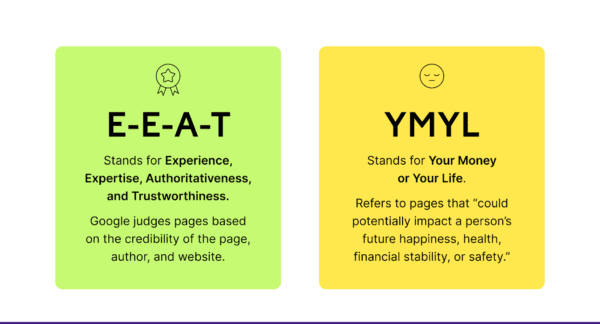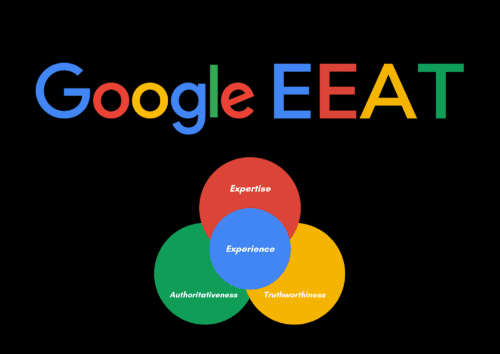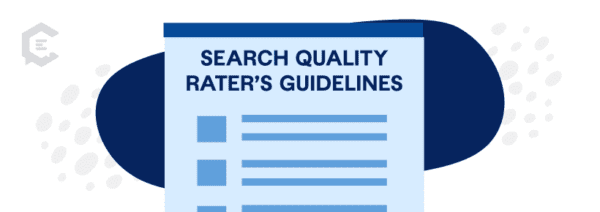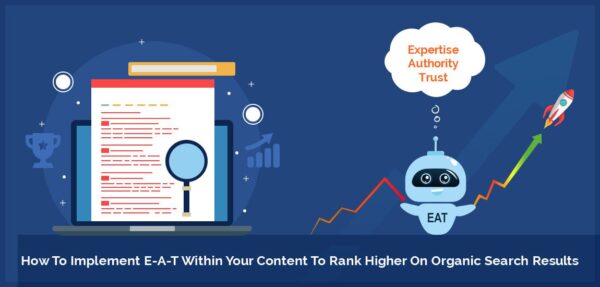Google EEAT is a concept that has been gaining traction in the world of search engine optimization (SEO). EEAT was originally EAT, and it stands for experience, expertise, authority, and trustworthiness. The experience variable is a recent add due to technological advancements. Google EEAT is the criteria that Google uses to evaluate the quality of your website’s content. Essentially, Google wants to make sure that the information you provide on your website is accurate, reliable, and trustworthy.
In the most basic sense, experience involves the first-hand and real-world encounters of the author of the content in relation to the subject of the content, while expertise is the knowledge and skill that your website’s content creators have in their field. Authority, on the other hand, refers to the reputation and influence that your website has in its niche. Trustworthiness, as the name suggests, is the credibility and reliability of the information provided on your website. By evaluating these factors, Google can determine whether your website’s content is high-quality and relevant to its users.

Understanding Google EEAT is essential if you are looking to improve your website’s search engine rankings. By creating content that demonstrates experience, expertise, authority, and trustworthiness, you can increase your website’s chances of ranking higher in Google search results. In the following article, we will explore the concept of Google E-E-A-T in more detail and provide tips and strategies for improving your website’s EEAT score and SEO ranking.
History of Google EEAT
Google’s EEAT stands for the set of guidelines (experience, expertise, authority, and trustworthiness) that Google uses to evaluate the quality of your website’s content and the expertise of its authors. EEAT is an important factor in Google’s search algorithm, as it helps to ensure that users are presented with high-quality, trustworthy, and useful content that meets their expectations when conducting searches on the internet.
EEAT was first introduced in Google’s Search Quality Evaluator Guidelines in 2014. However, it wasn’t until the August 2018 Medic update that EEAT became a major ranking factor. The Medic update was designed to improve the quality of search results for “Your Money or Your Life” (YMYL) queries, which are queries that could have a significant impact on a user’s health, finances, or safety.

Importance of Google EEAT in SEO
EEAT is an important factor in SEO because it helps Google determine the quality and relevance of a website’s content. As you know, SEO is all about adhering to what the algorithms of search engines consider as important when ranking content on the search engine results pages (SERPs). Websites that demonstrate high levels of experience, expertise, authoritativeness, and trustworthiness are more likely to rank well in search results. This is particularly important for YMYL queries, where inaccurate or misleading information could have serious consequences for your website’s ranking.
To improve your website’s EEAT, you should focus on creating high-quality, well-researched, and relevant content that demonstrates your expertise and authoritativeness in your field. You should also ensure that your website is well-designed, easy to navigate, mobile-friendly, and free from spammy or low-quality content.
Components of Google EEAT
To rank well on Google, it is essential to have a good understanding of Google EEAT. Experience, Expertise, Authoritativeness, and Trustworthiness are the four components of Google EEAT that the search engine considers to be crucial for creating high-quality content that users find valuable and trustworthy.

Experience
Google added the dynamic of experience to its EAT ranking factors with the advent of generative artificial intelligence. Experience concerns your first-hand and real-world involvement with the concepts you are addressing in a piece of content. From Google’s perspective, AI algorithms may be becoming better at telling stories and generating content, but telling such stories based on true experience is currently out of its scope. Google uses this experience to separate human from AI-generated content to maintain the genuine uniqueness of the content users are searching for.
Expertise
Expertise refers to the level of knowledge and skill that the content creator has in a particular field. Google wants to see that the content you have published is created by someone with a deep understanding of the topic and can provide valuable insights. Expertise can be demonstrated through credentials, experience, education, and how the concepts are addressed in the content. Expertise simply requires the creator of your website’s content to have the right credentials, knowledge, and qualifications to make the published content reliable and credible.
Authoritativeness
Authoritativeness refers to the reputation of the content creator or the website. Author authority is an important ranking factor for search engines, even though the impact is indirect, because it contributes to the quality and value of your content. Google wants to see that the content creator is an authority in the field and has a good reputation, bringing relevance to the previous elements of experience and expertise. Authoritativeness can also be demonstrated through backlinks, social media presence, and awards.

Trustworthiness
Trustworthiness refers to the level of trust that the audience has in the content creator or your website. High-quality, consistent, and valuable content are key to building this trust as a content marketer because users will be coming back to your website when searching for information, thereby revealing to search engines that your content is valuable. Google wants to see that the content creator is trustworthy and can be relied upon to provide accurate and reliable information. This trustworthiness can be demonstrated through transparency, reviews, and testimonials.
Implementing Google EEAT
As we discussed earlier, Google EEAT is a crucial SEO ranking factor for your website. Here are a few ways to implement it on your website:

Prioritize Experience
The creator of the content you publish on your website should demonstrate first-hand experience with the topics addressed. Use the following tips to demonstrate your experience:
- Hire authors with extensive experience
- Incorporate personal stories that relate to the subject
- Be consistent in providing high-quality content
- Include author credentials in the bio
Improving Expertise
To improve expertise, you need to have a team of experts who can create high-quality content. You should also make sure that your content is well-researched and accurate. Here are a few tips to improve your expertise:
- Hire experts in your niche
- Encourage your team to attend conferences and workshops
- Conduct regular training sessions for your team
- Create content that is well-researched and accurate

Boosting Authoritativeness
To boost authoritativeness, you need to establish your brand as an authority in your niche. Here are a few tips to boost authoritativeness:
- Create high-quality content that is relevant to your niche
- Build a strong social media presence
- Get backlinks from high-authority websites
- Collaborate with other experts in your niche
Establishing Trustworthiness
To establish trustworthiness, you need to make sure that your website is reliable and credible. Here are a few tips to establish trustworthiness:
- Use a secure website (https)
- Have a clear privacy policy
- Display customer reviews and ratings
- Use trust badges and seals
By implementing these strategies, you can improve your website’s Google EEAT and rank higher on SERPs.
Challenges and Solutions in Google E-E-A-T
Common E-E-A-T Issues
As we know, Google EEAT plays a significant role in determining the quality of your website’s content and overall ranking on Google. However, achieving high EEAT scores can be challenging, especially for smaller businesses and websites.
One common issue that websites face is a lack of expertise in the niche they choose to address in their content. This can be due to a variety of reasons, such as a lack of resources, limited experience, or a narrow focus. To overcome this issue, we recommend investing in expert content developers or hiring professionals with relevant experience in your field.

Another common issue is a lack of authoritativeness. This can be due to a lack of backlinks, poor website design, or a lack of industry recognition. To overcome this issue, we recommend building a strong backlink profile, improving website design and user experience, and seeking industry recognition through awards, partnerships, and collaborations. Taking these steps will help you adhere to the guidelines of Google’s latest algorithm of Search Quality Raters Guidelines.
Finally, trustworthiness can be a challenge for websites that are new or lack a strong reputation. This can be due to a lack of customer reviews, poor security measures, or a lack of transparency. To overcome these issues, we recommend implementing strong security measures, encouraging customer reviews, and being transparent about your business practices and policies.
Quick Tips for Overcoming Google EEAT Obstacles
To overcome EEAT obstacles, we recommend taking a holistic approach to your website’s content and overall online presence. This includes:

- Investing in quality content creation and optimization
- Building a strong backlink profile
- Improving website design and user experience
- Seeking industry recognition and partnerships
- Encouraging customer reviews and feedback
- Implementing strong security measures
- Being transparent about your business practices and policies
By taking these steps, you can improve your website’s EEAT scores and overall ranking on Google. Remember, achieving high EEAT scores is not a one-time strategy. Rather, it is an ongoing process that requires continuous effort and improvement.
Case Studies of Google EEAT Success
We have seen numerous websites that have successfully implemented EEAT principles and have achieved higher rankings on Google. Here are a few case studies of E-A-T success stories:
- Mayo Clinic: This website is a great example of how EEAT principles can be implemented in the healthcare industry. Mayo Clinic has a team of medical experts who regularly update their website with high-quality, accurate, and trustworthy medical information. They have also received numerous awards for their content quality and user experience, which has helped them rank higher on Google.
- Wirecutter: This website is known for its in-depth product reviews and recommendations. Wirecutter has a team of experts who thoroughly research and test products before recommending them to their readers. Their content is well-written, informative, and trustworthy, which has helped them establish themselves as a reliable source of information in the product review industry.
- TripAdvisor: This website is a popular travel platform that provides users with reviews and recommendations for hotels, restaurants, and attractions. TripAdvisor has a large community of users who regularly contribute reviews and ratings, which helps them establish their website as a trustworthy source of information.

Learning from Google EEAT Failures
While there are many success stories, there are also websites that have failed to implement EEAT principles and have suffered as a result. Here are a few examples of EEAT failures:
- Natural News: This website was penalized by Google for promoting false and misleading medical information. The website lacked expertise, authoritativeness, and trustworthiness, which led to a drop in their rankings.
- eHow: This website was penalized by Google for publishing low-quality content that lacked expertise and trustworthiness. The website had a large amount of user-generated content that was of poor quality, which led to a drop in their rankings.
- Demand Media: This website was penalized by Google for publishing low-quality content that lacked expertise and trustworthiness. The website had a large amount of user-generated content that was of poor quality, which led to a drop in their rankings.

In conclusion, implementing EEAT principles can have a significant impact on a website’s rankings on Google. By providing high-quality, accurate, and trustworthy content, websites can establish themselves as a reliable source of information in their industry. On the other hand, failing to implement EEAT principles can lead to a drop in rankings and a loss of credibility.

